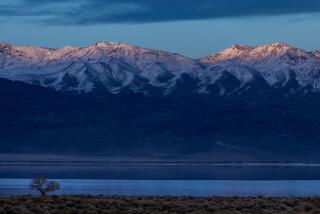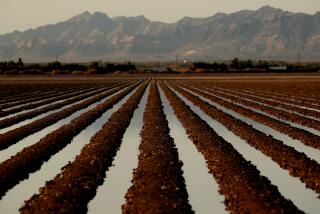U.S. urges conservation as Colorado River hit by drought
SAN DIEGO — As a regional drought tightens its grip on the Colorado River, water agency officials, environmentalists, farmers and Indian tribal leaders from the seven states that depend on the river for survival are expected to gather Tuesday for a “moving forward” meeting called by federal officials.
Last year was dry, this year is even worse, officials said.
If the trend continues, Lake Powell and Lake Mead, the Colorado River’s two giant reservoirs, will be at 45% capacity by year’s end, their lowest since 1968.
“Hydrologically, we’re not going in the right direction,” Michael Connor, commissioner of the U.S. Department of the Interior’s Bureau of Reclamation, said in advance of Tuesday’s meeting in San Diego.
The strategy to avoid cutbacks, officials said, lies in conserving more water in cities, suburbs and farms without resorting to the political bickering and legal fights that have marked the river’s recent history.
In December, the federal government released the results of a three-year study warning that drought, climate change and population growth are fast outstripping the water supply from the Colorado River.
The river provides for the daily needs of 40 million people, including those in Los Angeles, San Diego, Denver, Las Vegas and Phoenix. Farmers and ranchers in western states also use the river to irrigate 4 million acres of cropland where 15% of the nation’s food supply is grown.
The December report and its “call to action” cannot become “a study that just sits on a shelf,” said Anne Castle, assistant Interior secretary for water and science.
Officials are expected to form three committees to examine the problem and propose solutions. One will involve municipal water agencies, a second will deal with agriculture interests and a third will address the concerns of environmental groups.
The Colorado is frequently listed by the Washington, D.C.-based American Rivers environmental group as being among the nation’s most troubled waterways. Gary Wockner, campaign coordinator of the Save the Colorado group, said he will be closely monitoring the environmental committee.
Wockner said he wants to see that the “moving forward” approach “provides hope for both the ecological health of the river and the millions of people who depend on it.”
More to Read
Sign up for Essential California
The most important California stories and recommendations in your inbox every morning.
You may occasionally receive promotional content from the Los Angeles Times.










